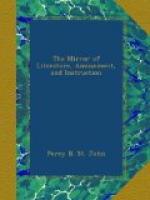(1819)—A short time before dinner he left the room, and in a minute or two returned, carrying in his hand a white leather bag. “Look here,” he said, holding it up,—“this would be worth something to Murray, though you, I dare say, would not give sixpence for it.” “What is it?” I asked.—“My Life and Adventures,” he answered. On hearing this, I raised my hands in a gesture of wonder. “It is not a thing,” he continued, “that can be published during my lifetime, but you may have it if you like—there, do whatever you please with it.” In taking the bag, and thanking him most warmly, I added, “This will make a nice legacy for my little Tom, who shall astonish the latter days of the nineteenth century with it.” He then added, “You may show it to any of our friends you may think worthy of it:”—and this is nearly word for word, the whole of what passed between us on the subject.
To Mr. Moore.
“January 2nd, 1820.
“My Dear Moore,
“’To-day it is
my wedding-day,
And all the folks
would stare
If wife should dine at Edmonton,
And I should dine
at Ware.’
Or thus—
“Here’s a happy
new year! but with reason
I beg you’ll
permit me to say—
Wish me many returns
of the season,
But as few
as you please of the day.
“My this present writing is to direct you that, if she chooses, she may see the MS. Memoir in your possession. I wish her to have fair play, in all cases, even though it will not be published till after my decease. For this purpose, it were but just that Lady B. should know what is their said of her and hers, that she may have full power to remark on or respond to any part or parts, as may seem fitting to herself. This is fair dealing, I presume, in all events.
“To change the subject, are you in England? I send you an epitaph for Castlereagh.
* * * * *
Another for Pitt—
“With death doom’d to grapple
Beneath this cold slab, he
Who lied in the Chapel
Now lies in the Abbey.
“The gods seem to have made me poetical this day—
“In digging up your bones, Tom Paine,
Will. Cobbett has done
well:
You visit him on earth again,
He’ll visit you in hell.
Or—
“You come to him on earth again,
He’ll go with you to
hell.
“Pray let not these versiculi go forth with my name, except among the initiated, because my friend H. has foamed into a reformer, and, I greatly fear, will subside into Newgate; since the Honourable House, according to Galignani’s Reports of Parliamentary Debates, are menacing a prosecution to a pamphlet of his. I shall be very sorry to hear of any thing but good for him, particularly in these miserable squabbles; but these are the natural effects of taking a part in them.”




